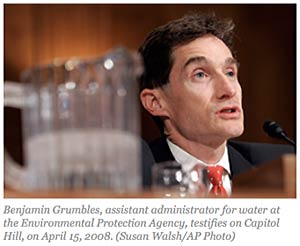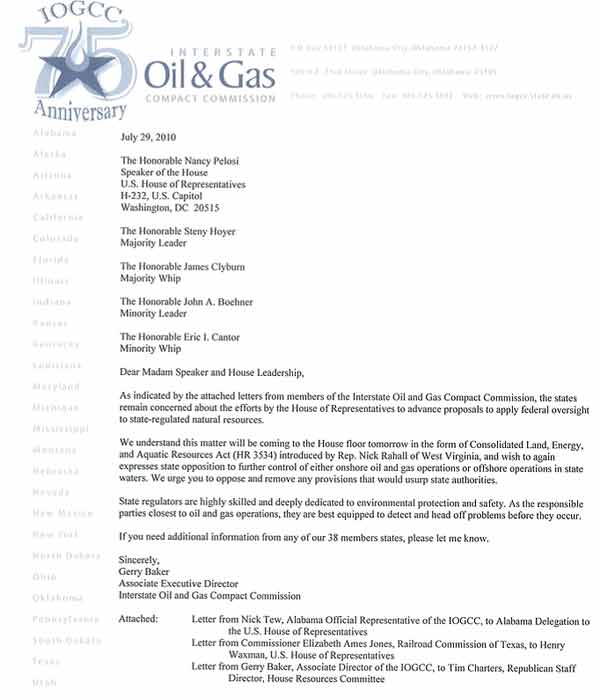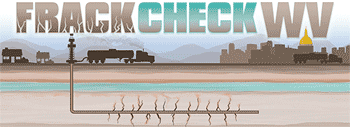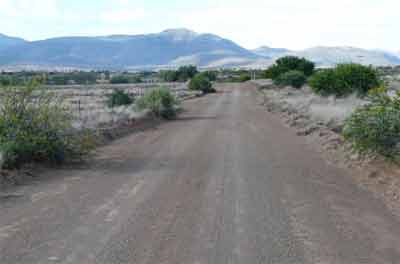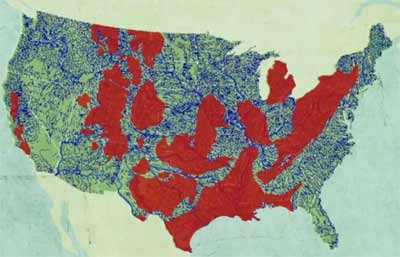Biblio
When Benjamin Grumbles was assistant administrator for water at the Environmental Protection Agency in the George W. Bush administration, he oversaw the release of a 2004 EPA report that determined that hydraulic fracturing was safe for drinking water. Then he watched as Congress used those findings to bolster the case for passing a law that prohibited the EPA from regulating fracking under the Safe Drinking Water Act.
In two interviews with ProPublica -- the first on June 29, 2009, soon after he left the EPA, and the second on March 5, 2011 -- Grumbles ponders the criticism leveled at the 2004 study and suggests that it's now time for Congress and the EPA to take another look at hydraulic fracturing. Our questions, and his answers, have been combined and edited for length to the version you see here.
Grumbles is currently on the board of the Clean Water America Alliance, a group focusing on water sustainability issues. He has also served as head of Arizona's Department of Environmental Quality.
Tempers and dangers are ramping up in the gas field we call home.
"Ah, for the good old days in the springtime of the Barnett Shale boom, when the words “royalty check” were enough to get homeowners to sign away their mineral rights and everyone still thought the 3 a.m. screech of drilling equipment was just the sound of money.
When no one thought that wells could possibly send property values tumbling or turn well water brown, before drilling sites and pipelines had started leaking, burping, and blowing up. When there were no neighborhood groups ganging up to demand higher royalties, tighter controls, or — say it ain’t so — trying to stop wells outright...
...Even gas company officials admit that the boom is drawing more and more inexperienced workers to drilling sites. “Veteran crews are being divided up and filled with people who have no experience whatsoever working rigs, laying pipe, and such,” said pipeline company manager Jerry Holsworth.
And so accidents are increasing. At least two people have been killed in Barnett Shale operations thus far.
Frac Tech is one of the smaller companies mentioned in the memorandum to Members of the Subcommittee on Energy and Environment from Chairman Henry A. Waxman and Subcommittee Chairman Edward J. Markey Examining the Potential Impact of Hydraulic Fracturing. (PDF)
Frac Tech describes itself as “one of the largest and fastest growing land stimulation companies.”
Little is known about the practices of these and other small and medium sized companies that provide fracturing services across the country.
Frac Tech's CEO Dan Wilk received one of the eight letters from this Committe on February 18, 2010. They are listed in this document:
Energy & Commerce Committee Investigates Potential Impacts of Hydraulic Fracturing.
See Shale Maps of the U.S, World, Australia, China, Eastern Europe and the Middle East.
See: Jaime Adame. "Cisco's Frac Tech Grows". August 7, 2010. Abilene Reporternews Online.
This website is a joint project of the Ground Water Protection Council and the Interstate Oil and Gas Compact Commission. It was launched on April 11, 2011 and only covers wells drilled starting in 2011. It appears to be an attempt at Gas Industry "transparency" and has funding support from the U.S. Depatment of Energy (DOE). It claims to disclose the chemical additives used in the hydraulic fracturing process on a well-by-well basis.
Of all the lobbyists bringing their issues to Capitol Hill, the Groundwater Protection Council is one of the smaller players. I have to wonder, reading the rankings on Open Secrets, "Lobbying Spending Database: Environment, 2009", why this groundwater organization spends less on its annual lobbying than "Fur Wraps the Hill" or the "Pittsburgh Parks Conservancy"? Groundwater is a hot button national issue, affecting both the urban and agricultural sectors.
The industry groups proudly stamping their logos on FracFocus need to come up with more cash or be outed as a do-nothing front organization advocating the corporate pillaging of our natural resources in the name of energy development. They wave the Tenth Amendment around like the flag at Iwo Jima.
How do they demonstrate the committment to "protecting our nation's ground water"? They conveniently share an address with the Interstate Oil and Gas Compact Commission (IOGCC). 13308 N. MacArthur Blvd., Oklahoma City, OK.
IOGCC claims to have a noble mission but talk is cheap... They advocate less intervention by the Federal government on behalf of the shared resources in our environment. Twenty thousand bucks?
Read between the lines! Here is a letter written to Congress by the IOGCC calling for the Feds to keep their hands off! The $20,000 looks like a smokescreen to me. Pocket change...(Neil Zusman, 2011-05-24).
From their website:
On this site you can search for information about the chemicals used in the hydraulic fracturing of oil and gas wells. You will also find educational materials designed to help you put this information in perspective.
See: Chu Names Panel to Study Fracking.
My critique of the NYT Green report
Broder's piece goes on to offer a smokescreen of protest by the right, but according to Dusty Horwitt of the Environmental Working Group, “An industry insider like John Deutch is completely unacceptable to lead this panel...It looks as if the Obama Administration has already reached the conclusion that fracking is safe.”
FrackCheckWV.net was created as a platform for educating citizens about the environmental impacts of hydraulic fracturing and providing tools and guidance for effective citizen action and advocacy.
The editors of this site are volunteers with watershed and conservation groups in both West Virginia and neighboring states.
Excellent website has sections on Take Action, About, Friends, Impacts, Regulation, Your Report, Calendar, Cool Blogs and Links.
See: New WVU-Va Tech study links water quality and cancer deaths in West Virginia coalfields
See: West Virginia Surface Owners' Rights Organization (WVSORO)
See: West Virginia Blue: Dunkard Creek fish kill
See: The risks of oil and gas production acknowledged around the world
See: Fight Over Gas Wells in Chief Logan Heads to Supreme Court
See: WATER: Gas drilling in huge Appalachia reserve yields foul, briny byproduct - AP
See: Natural Gas Drilling Threatens Communities in Northeastern United States
See: Marsh Fork Elementary: Journey Up Coal River | A Community and Strip Mining
Pennsylvania environment officials are racing to clean up as much as 8,000 gallons of dangerous drilling fluids after a series of spills at a natural gas production site near the town of Dimock last week...
...The incident is the latest in a series of environmental problems connected to Cabot’s drilling in the Dimock area. Last winter, drinking water in several area homes was found to contain metals and methane gas that state officials determined leaked underground from Cabot wells. And in the spring, the company was fined for several other spills, including an 800-gallon diesel spill from a truck that overturned.
Site includes extensive background information.
A moratorium on hydraulic fracturing has been under effect in South Africa since April, 2011.
On Friday 25 March, environmental activist Lewis Pugh delivered a passionate call to action at a public lecture in Cape Town. He implored South Africans to stand up for our rights – particularly the right to water, and the right to a healthy environment – and take on corporate bullies like Shell. If you care about the Karoo, if you care about our country, keep reading...
Ladies and gentlemen, that is what is at stake here today: our children's future. And that of our children's children.
There may be gas beneath our ground in the Karoo. But are we prepared to destroy our environment for five to ten years worth of fossil fuel and further damage our climate? Yes, people will be employed – but for a short while. And when the drilling is over, and Shell have packed their bags and disappeared, then what? Who will be there to clean up? And what jobs will our children be able to eke out?
Now Shell will tell you that their intentions are honourable. That fracking in the Karoo will not damage our environment. That they will not contaminate our precious water. That they will bring jobs to South Africa. That gas is clean and green. And that they will help secure our energy supplies. When I hear this, I have one burning question. Why should we trust them? Africa is to Shell what the Gulf of Mexico is to BP.
Shell, you have a shocking record here in Africa. Just look at your operations in Nigeria. You have spilt more than 9 million barrels of crude oil into the Niger Delta. That's twice the amount of oil that BP spilt into the Gulf of Mexico. You were found guilty of bribing Nigerian officials, and to make the case go away in America, you paid an admission of guilt fine of $48 million. And to top it all, you stand accused of being complicit in the execution of Nigeria's leading environmental campaigner, Ken Saro-Wira, and eight other activists. If you were innocent, why did you pay $15.5 million to the widows and children to settle the case out of court?
Shell, the path you want us to take us down is not sustainable. I have visited the Arctic for seven summers in a row. I have seen the tundra thawing. I have seen the retreating glaciers. I have seen the melting sea ice. And I have seen the impact of global warming from the Himalayas all the way down to the low-lying Maldive Islands. Wherever I go, I see it.
Now is the time for change. We cannot drill our way out of the energy crisis. The era of fossil fuels is over. We must invest in renewable energy. And we must not delay.
Shell, we look to the north of our continent and we see how people got tired of political tyranny. We have watched as despots, who have ruled ruthlessly year after year, have been toppled in a matter of weeks. We too are tired. Tired of corporate tyranny. Tired of your short-term, unsustainable practices. We watched as Dr Ian Player, a game ranger from Natal, and his friends, took on Rio Tinto (one of the biggest mining companies in the world) and won. And we watched as young activists from across Europe, brought you down to your knees, when you tried to dump an enormous oil rig into the North Sea.
Shell, we do not want our Karoo to become another Niger Delta. Do not underestimate us. Goliath can be brought down. We are proud of what we have achieved in this young democracy, and we are not about to let your company come in and destroy it.
So let this be a call to arms to everyone across South Africa, who is sitting in the shadow of Goliath: stand up and demand these fundamental human rights promised to you by our Constitution. Use your voices – tweet, blog, petition, rally the weight of your neighbours and of people in power. Let us speak out from every hilltop. Let us not go quietly into this bleak future.
Let me end off by saying this: you have lit a fire in our bellies, which no man or woman can extinguish. And if we need to, we will take this fight all the way from your petrol pumps to the very highest court in this land. We will take this fight from the farms and towns of the Karoo to the streets of London and Amsterdam. And we will take this fight to every one of your shareholders. And I have no doubt, that in the end, good will triumph over evil. DM
Lewis Pugh is a lawyer and environmental activist. He belongs to the Treasure the Karoo Action Group.
See: Aragom Eloff. Ivo Vegter vs. the Fracking Fringe. 2011-04-18.
See: Julienned DuToit. Fracking the Karoo - The People Say No! 2011-01-31.
See: Robert Brand. South Africa Endorses Plans For Karoo Gas-Drill Freeze, Ending Shell Hopes - Bloomberg. 2011-04-21.
See: Donald Paul. Drill Baby Drill. 2011-04-18.
Bob and Lisa were told by their doctor to move out of their home withing 48 hours because it was too dangerous for them to stay after they were diagnosed with drilling chemicals in their blood and organs.
Videos and posting by Bluedaze Sharon Wilson.
Brandon Evans. 9/27/2010. Fight for Survival. Wise County Messenger. Online Edition.
It doesn't have to be this way. There are affordable emission controls that industry could use to prevent 90% of the emissions. These are some of the best practices least destructive practices described in DRILL RIGHT TEXAS: Best oil & gas development practices for Texas. Industry refuses to use control technology unless it is mandated.
Before you go all weird and start attacking Texas, have a look at this map and know that they are finding more shale areas everyday, everywhere, all across the globe. Shale gas is the biggest scam ever played on the human race.
Keep drilling toxics out of our drinking water.
Tell your Senators and Representatives to support the FRAC Act.
Gas drilling companies such as Halliburton say the gas drilling technique known as hydraulic fracturing, or fracking, is safe, but opponents contend it pollutes groundwater with dangerous substances.
Now, new evidence has emerged possibly linking natural gas drilling to groundwater contamination. ProPublica journalist Abrahm Lustgarten reports federal officials in Wyoming have found that at least three water wells contain chemicals used in hydraulic fracturing.
Ontario has a new blog:
Stop Fracking Ontario is a web project to inform and promote activism against fracking in Ontario, and in the surrounding region, and elsewhere.
This project is an all-volunteer non-partisan effort that is not tied to any one organization. We will need a broad coalition of citizens to apply ongoing pressure which could stop the fracking industry.
We also need to support a range of positive alternatives, so we can phase out natural gas.
See: Nelson, Joyce. “Ugly Reality of Fracking.” Greenmuze, April 19, 2011.
Independent vibrant, Canadian online magazine based in British Columbia.
Earlier this year at Two Island Lake north of Fort Nelson, two corporations, Encana and Apache, blasted an estimated 5.6 million barrels worth of water along with 111 million pounds of sand and unknown chemicals to fracture apart dense formations of shale over a 100 day period, or what Parfitt calls "the world's largest natural gas extraction effort of its kind."
...Many experts argue that shale gas could retire coal-fired plants or slow down the deployment of wind and solar projects altogether. Others contend that shale formations deplete too quickly to offer secure supplies for the future. At the same time, the "shale gale" has also created abiding controversies about water use, groundwater contamination and the regulation of the industry from Wyoming to Quebec.
Fracture Lines, commissioned by the Program on Water Issues at University of Toronto's Munk Centre, not only sheds light on the scale of development from British Columbia to New Brunswick but highlights industry's largely unregulated water use.
"In the absence of public reporting on fracking chemicals, industry water withdrawals and full mapping of the nation's aquifers, rapid shale gas development could potentially threaten important water resources if not fracture the country's water security," concludes Parfitt. (Parfitt, 2010)
Parfitt, B. Fracture Lines: Will Canada’s Water be Protected in the Rush to Develop Shale Gas? Program on Water Issues Munk School of Global Affairs at the University of Toronto, September 15, 2010.
Agriculture officials have quarantined 28 beef cattle on a Pennsylvania farm after wastewater from a nearby gas well leaked into a field and came in contact with the animals.
The state Department of Agriculture said the action was its first livestock quarantine related to pollution from natural gas drilling. Although the quarantine was ordered in May, it was announced Thursday.
Carol Johnson, who along with her husband owns the farm in north-central Pennsylvania, said she noticed in early May that fluids pooling in her pasture had killed the grass. She immediately notified the well owner, East Resources Inc.
"You could smell it. The grass was dying," she said. "Something was leaking besides ground water."
The Johnsons' farm sits atop the Marcellus Shale, a layer of rock that lies under swaths of West Virginia, Pennsylvania, New York and Ohio. As ProPublica has reported, reports have proliferated of groundwater pollution, spills and other impacts of hydraulic fracturing, a drilling technique that injects massive amounts of water, sand and chemicals underground to break up the formations that hold the gas.
UB geologist Tracy Bank and colleagues found that uranium and hydrocarbons in Marcellus shale are not just physically, but also chemically, bound.
Scientific and political disputes over drilling Marcellus shale for natural gas have focused primarily on the environmental effects of pumping millions of gallons of water and chemicals deep underground to blast through rocks to release the natural gas.
But University at Buffalo researchers have now found that that process -- called hydraulic fracturing or "fracking"-- also causes uranium that is naturally trapped inside Marcellus shale to be released, raising additional environmental concerns.
The research will be presented at the annual meeting of the Geological Society of America in Denver on Nov. 2.
See: Casey Junkins. November 20, 2010. The Intelligencer Wheeling News-Register. "Profs: Wells Pose Threat: Fracking lets loose uranium, other hazards".
Dan Bain, assistant professor of geology at Pitt, and Radisav Vidic, professor of environmental engineering at Pitt, expressed concern about drilling for gas in areas throughout West Virginia and Pennsylvania because of the region's great history of coal production.
"Pennsylvania is filled with abandoned coal mines. I don't want to see this happen with gas drilling," Bain said.
An AB Resources well site about 6 miles outside Moundsville's city limits was home to a June 7 explosion, due to workers breaching a pocket of methane in an old coal mine. After injuring several workers, the charge ignited a large fireball that burned for several days.
“Do you know what fracking the Karoo is like?” demanded Esme Senekal of Somerset East. The people from Royal Dutch Shell and their consultants didn’t reply, their faces impassive.
“It’s like you coming and drilling holes in our mother, and then leaving us to look after her and take her to hospital. Leave the Karoo alone!
“This is the last piece of holy nature in this country. No money is worth this. You can’t replace pristine nature with money.”
The surrounding sunburnt Karoo farmers, not a group usually given to high emotion, loudly applauded her.
The public meeting, organised by Shell’s consultants, Golder Associates (slogan: “Engineering Earth’s development, protecting Earth’s integrity”), was held at the Somerset East Town Hall, and started with a prayer to protect God’s creation, nature.
Most of the attendees bowing their heads were farmers who face the possibility of losing everything if, heaven forbid, shale gas is found under their farms – or for that matter, anywhere in the Karoo.
See: Aragom Eloff. Ivo Vegter vs. the Fracking Fringe. 2011-04-18.
See: Donald Paul. Drill Baby Drill. 2011-04-18.
See: Lewis Pugh. Frack Off, Shell!. 2011-04-05
See: Robert Brand. South Africa Endorses Plans For Karoo Gas-Drill Freeze, Ending Shell Hopes - Bloomberg. 2011-04-21.







